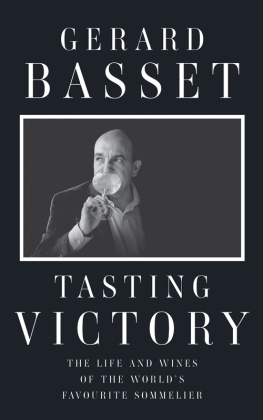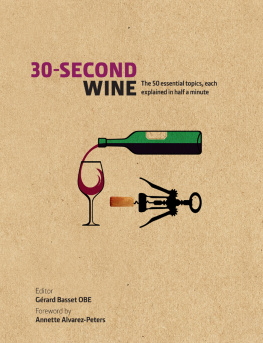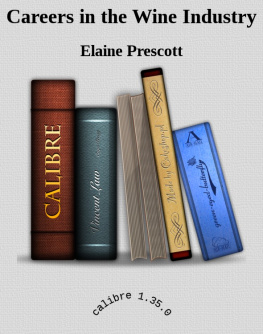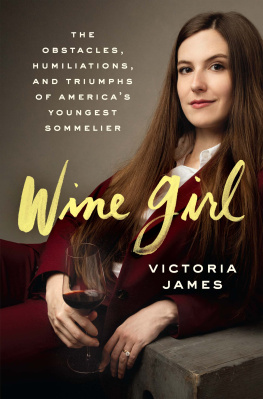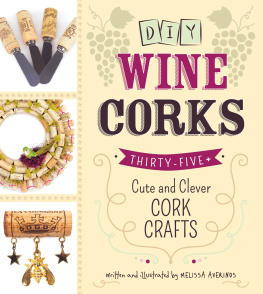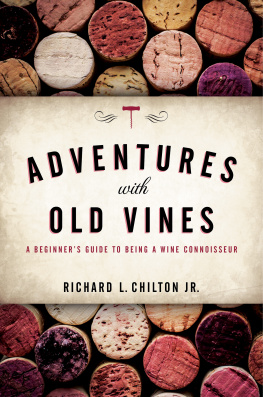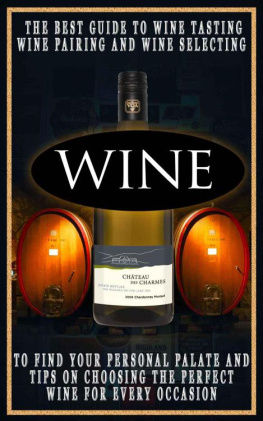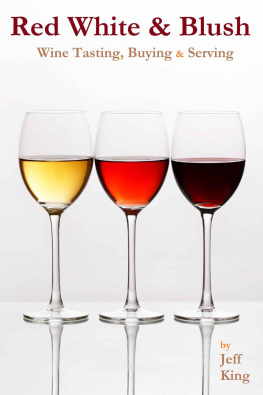
Dedication
There are so many people I could and should dedicate this book to, who helped me on my journey. To my friends and colleagues, please forgive me for not naming you all. However, I must thank Jancis Robinson, Raymond Blanc and Felicity Carter for all of their help and guidance this book would not exist without their help thank you, all three.
There are two more special people I must mention: my wife Nina, without whom none of this would have been possible. And the other is my son, Roman, who has given me such joy and made me so proud. This book is for you, Roman. I love you now and for ever, Papa. Xxx
With special thanks to
Jackson Family Wines
Michael Hill Smith MW
Gold Supporters
Sarah Abbott
AXA Millsimes Gestion Bordeaux
Nina and Romane Basset and Anthony Howe
Paolo Basso
Lewis Chester
Chewton Glen Hotel
Mayu Saito
Martin and Brigitte Skan
TEXSOM
Contents
Preface
Windsor Castle, 2011
Wed been briefed on what to do, but I didnt want to commit a faux pas. I watched what the person in front of me was doing.
Finally, I advanced and took my place in front of Her Royal Highness, Princess Anne. I bowed as I had been told and then Princess Anne talked to me in excellent French. She congratulated me on my career and even referred to some specific events I had been involved with. I was surprised and full of admiration that she could remember so much, as I was not the only one to receive an award that day.
She put the OBE medal on my jacket. A minute later I was quietly guided through some corridors to sit silently at the back of the room, to watch the rest of the ceremony. My family was in one of the front rows and I would only join them when the ceremony was complete.
The organisation was a perfect example of true hospitality. Over in one corner, for example, the musical quartet played well-known songs, including a few French ones. I was touched that they had added some French songs to the list, which I imagine they did because I, one of the recipients, am a Frenchman.
It was ironic that I was there, being born French and not being interested in English royalty for a long time. When I first came to live in the UK, I could not understand why the royals were so popular after all, in France, we had guillotined our king! Over the years my views changed and I had come to admire the work they do for different charities. In addition, I had become British in 1990, so by the time I received this honour I was fully committed to both Great Britain and the royal cause.
Thursday 20 October 2011 was a magic moment. Yet I could reflect with a certain melancholy on the long journey it had been, from grim beginnings in Saint-Etienne all the way to Windsor Castle.
One
Humble Beginnings
There is nothing wrong with Saint-Etienne, where I was born, but nothing special about the place either. A medium-sized industrial town near Lyon, it was the birthplace of Casino, a large French chain of supermarkets. It also boasted a two-star Michelin restaurant that we never visited, some universities of great national prestige and Les Verts, once Frances best football team. But despite all these achievements, the Saint- Etienne of my youth could feel bleak. It is very cold in winter owing to a continental climate exacerbated by its high altitude, and it can be very stuffy in the summer. Its beauty lies in the surrounding countryside, whose hills inspired me, making me feel like a racer in the Tour de France as I cycled over them.
My family did not lack money, as my fathers father had been a successful local architect and my mothers father had been a partner in a small but flourishing factory. We had a nice house, thanks in part to our grandparents, who helped with family finances.
What the Basset family lacked was harmony. My mother Marguerite, a qualified midwife who had never practised, married my father, Pierre- Ren, a factory draughtsman, because their two families wanted them to. Both sets of grandparents, unfortunately, were oblivious to the fact that my parents couldnt stand each other. Despite their mutual loathing, my parents produced three children my sister Antoinette, thirteen years older than me, my brother Jean-Henri who is eight years older, and then me. By the time I was five my sister had gone to work and live in Lyon, and my brother left home by the time I was ten.
They left me in the company of parents who were odd, to say the least. They did not have many friends, as I dont think they knew how to interact with people very well. This is not surprising as they could hardly interact with one another. Neither learnt to drive, so we always had to use public transport, rarely went anywhere and were stuck with each other.
We never had holidays abroad, as my father used to maintain that people go abroad on holiday when they hardly know their own country. Unfortunately, he didnt feel it necessary to explore French regions either, so we simply stayed in the area. At least we had a holiday home in the countryside, thanks to my grandparents, which was twenty-five kilometres away from home. My mother, my sister, my brother and I went there during the school holidays and some weekends; my father would join us on weekends and during his month-long holiday. It is a shame to say this, but it was better when my father was not there, as we could enjoy the small, simple house in peace.
There was a farm next door, where Remi the farmer lived with his dog and I was allowed to play among the cows and goats. Its also where I had one of my first, formative food experiences. One day, Remi grabbed one of his chickens, knocked it dead and then pierced the head with a sharp knife. Remi filled a glass with the blood, which he left to thicken in the fridge for a few hours. Later, he pan-fried the solid chicken blood in small cubes with parsley and garlic. I had a portion of the finished dish, which is called sanguette. While I felt sorry for the chicken, the result was delicious.
But my parents sold the holiday house when I was six, along with the family home, so they could afford a new house. From then on, until I was sixteen, we were trapped at home together and without a television.
My father was against us having a TV, because he said programmes were infantile and not good for education. He may have been right, but television was good for social bonding. In France in the 1960s there were only two national TV channels with two big evening shows, which everyone else at school would watch and talk about the next day. It was frustrating not to be able to enter into the conversation. My fathers odd beliefs were turning me into an oddity too, excluding me from my peers.
I had another source of shame as well.
My parents argued continually, and it sometimes spiralled into violence. When I was six, I saw my brother try to separate my parents, only to have his arm slashed by the knife one of them was holding. He was cut badly and still bears a large scar today. There were times I saw my parents fight so badly, they both ended with bloody faces.
At school we were given books of family stories, textbook examples of how things should be. I didnt recognise the situations. For me, returning home each day filled me with dread, because I never knew if I would find my parents alive and well or not. Luckily for us, we lived in a detached house if we had lived in a flat, like most of my schoolmates, we would have been expelled for causing a disturbance. My parents shouted insults and threats to one another so loudly that the neighbours could hear everything. I felt the humiliation deeply. Every time I turned the corner to my home street, the tension forced my head down to look at the pavement. From 200 yards away, I would hear my parents shouting at one another. I only ever took friends home if I was totally sure that one of my parents would not be back until late.
Next page
